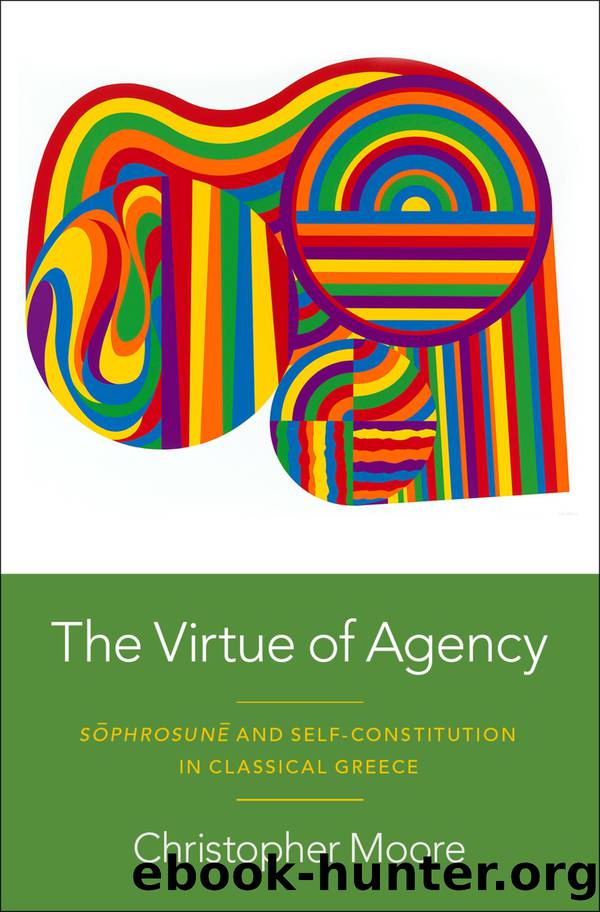The Virtue of Agency by Christopher Moore;

Author:Christopher Moore;
Language: eng
Format: epub
Publisher: Oxford University Press USA
Published: 2023-09-15T00:00:00+00:00
Debating the Value of Sôphrosunê in the Gorgias
The first half of the Gorgias concerns justice explicitly: Socrates reveals Gorgiasâ inconsistency about his teaching of justice to his students, and he reverses Polusâ preference for doing injustice over suffering injustice, persuading him that wrongdoers ought to look forward to their punishment.18 In fact, in the dialogueâs first forty-four pages, no character uses the word sôphrosunê. The interlocutorsâ attention to justice is explained by their focus on rhetoricâs power in the civic sphere, the democratic power to persuade assemblies about the just thing to do and the tyrannical power to exercise personal rule and thereby arrogate what is othersâ to oneself. When Callicles first joins the conversation, skeptical about Socratesâ argumentative successâhe accuses Socrates of repeated equivocationâthe topic remains justice.19 And so it remains when Callicles offers his putatively radical sociopolitical theory, claiming that the conventional praise of justice is an ideology of the weak and comes from those who are unable to protect themselves otherwise from the overreach of the strong, and that justice actually denotes the success in that overreach by the strong.20
It is only once Socrates presses Callicles on the identity of the âstrongerâ or âsuperiorâ that sôphrosunê arises; once it does, and the conversation comes to concern the best way of life more than the correct sociopolitical theory, sôphrosunê becomes the focal idea of the conversation.21 Set at the very argumentative heart of the Gorgias is a debate about the value of that virtue. The debate does not occasion the fine-grained discussions of the virtueâs structure that we will find in the Republic and Charmides and does not equate it with wisdom or justice as we saw in the Protagoras, but it brings urgency to such careful discussions and refines some of their findings. Callicles disagrees with Socrates about sôphrosunêâs contribution to agency: he believes that it impedes doing what one intends, and is thus contra-agential; Socrates judges it essential for doing what one intends, and is thus pro-agential. Their disagreement turns on their attitude toward a personâs desires. Callicles treats all desires as, so to speak, equally oneâs own and equally deserving of satisfaction; Socrates treats only those desires directed toward whatâs good as worthy of oneâs affirmation, commitment, and identification with, and thus deserving of satisfaction. This difference about desires amounts to a difference about agency. For Callicles, robust agency comes through satisfying oneâs desires, and the more desire-satisfaction there is, the more agency there is. This is because for Callicles we are our desires; to be actualized as ourselves is for our desires to be realized. For Socrates, robust agency comes through satisfying only good desires, and the better those desires, the more agency there is. This is because for Socrates whatâs good is what we ultimately desire; to be actualized as ourselves is for our desires for the good to be realized. Thus Callicles, taking sôphrosunê as the limitation of desire, judges it harmful to agency; Socrates, taking it in the same way, judges it conducive to agency.
Download
This site does not store any files on its server. We only index and link to content provided by other sites. Please contact the content providers to delete copyright contents if any and email us, we'll remove relevant links or contents immediately.
| Deconstruction | Existentialism |
| Humanism | Phenomenology |
| Pragmatism | Rationalism |
| Structuralism | Transcendentalism |
| Utilitarianism |
The remains of the day by Kazuo Ishiguro(7577)
Tools of Titans by Timothy Ferriss(6970)
The Black Swan by Nassim Nicholas Taleb(6206)
Inner Engineering: A Yogi's Guide to Joy by Sadhguru(5917)
Giovanni's Room by James Baldwin(5898)
The Way of Zen by Alan W. Watts(5813)
The Six Wives Of Henry VIII (WOMEN IN HISTORY) by Fraser Antonia(4801)
The Power of Now: A Guide to Spiritual Enlightenment by Eckhart Tolle(4775)
Astrophysics for People in a Hurry by Neil DeGrasse Tyson(4631)
Asking the Right Questions: A Guide to Critical Thinking by M. Neil Browne & Stuart M. Keeley(4603)
12 Rules for Life by Jordan B. Peterson(3753)
The Ethical Slut by Janet W. Hardy(3513)
Skin in the Game by Nassim Nicholas Taleb(3484)
Housekeeping by Marilynne Robinson(3424)
The Art of Happiness by The Dalai Lama(3392)
Double Down (Diary of a Wimpy Kid Book 11) by Jeff Kinney(3287)
Skin in the Game: Hidden Asymmetries in Daily Life by Nassim Nicholas Taleb(3275)
Walking by Henry David Thoreau(3239)
12 Rules for Life: An Antidote to Chaos by Jordan B. Peterson(3211)
